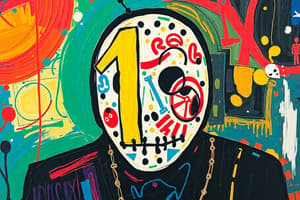Podcast
Questions and Answers
What is the significance of the number eight in Chinese superstition?
What is the significance of the number eight in Chinese superstition?
- It is considered unlucky due to its pronunciation similarity to a word meaning 'to die'. (correct)
- It is a factorial number.
- It is associated with resurrection and rebirth.
- It symbolizes prosperity and good luck.
How do repeated patterns appear when multiplying by eight?
How do repeated patterns appear when multiplying by eight?
- Random patterns
- Patterns of zeros
- Repeated patterns of ones (correct)
- Alternating patterns
What mathematical properties make the number eight stand out?
What mathematical properties make the number eight stand out?
- Being a prime number
- Being a factorial number (correct)
- Being an odd number
- Being a fraction
What does the number eight symbolize in Hinduism?
What does the number eight symbolize in Hinduism?
Why do some cultures associate the number eight with new beginnings?
Why do some cultures associate the number eight with new beginnings?
Which mathematical operation results in numbers that must always be divisible by eight?
Which mathematical operation results in numbers that must always be divisible by eight?
What positive association does the number eight have in Asian cultures?
What positive association does the number eight have in Asian cultures?
Who was the figure associated with wisdom and strategy in ancient Greek mythology?
Who was the figure associated with wisdom and strategy in ancient Greek mythology?
In Arabic culture, what does the number eight represent?
In Arabic culture, what does the number eight represent?
What characteristics are associated with individuals born under the influence of the number eight in numerology?
What characteristics are associated with individuals born under the influence of the number eight in numerology?
What negative association does the number eight have in Japanese and Buddhist traditions?
What negative association does the number eight have in Japanese and Buddhist traditions?
What does the number eight symbolize in some cultures due to its sound similarity with a certain word?
What does the number eight symbolize in some cultures due to its sound similarity with a certain word?
Flashcards are hidden until you start studying
Study Notes
Eight is one of those numbers we encounter frequently throughout our lives. It's the number that comes after seven when counting, it can represent a new beginning, especially since eight starts with the letter 'e', often symbolizing growth or starting something fresh. Here, we will explore five subtopics related to the number eight:
Subtopic 1: Positive Associations with Number Eight: In many cultures around the world, the number eight has positive connotations. For example, people from Asian countries associate this number with good luck and prosperity because it sounds like the word for wealth in Chinese. Similarly, in ancient Greek mythology, the figure of Athena was associated with wisdom, strategy, craftsmanship, strength, and courage; she was also known as the goddess of war, making her an important part of cultural history. In Arabic culture, the number eight represents happiness and fortune. Also, in numerology, an individual who was born under the influence of the number eight is considered strong, powerful, self-possessed, self-confident, determined, ambitious, assertive, and capable of great achievements.
Subtopic 2: Negative Connotation: Despite its general positivity, there are some negative associations with the number eight. For instance, it relates to the idea of suffering and death in Japanese and Buddhist traditions. This might have come about during the early years of Christianity, where Jesus Christ died on Good Friday, which fell every year on the Day of Eights. Additionally, in Chinese superstition, the number eight is considered unlucky due to its pronunciation similarity to another sound that means "to die". Therefore, it is common for couples to avoid marrying on the eighth day of any month.
Subtopic 3: Constants in Mathematics: The number eight plays a significant role in mathematics. It is a perfect square and cube; hence, ( \sqrt{8} = 2\sqrt{4}) and ( 8^3 = 2^7). Furthermore, eight is a factorial number, meaning it equals the product of all whole numbers less than itself. For instance, 5! (( 5!)) equals 5 x 4 x 3 x 2 x 1, while 8! (( 8!)) equals 8 x 7 x 6 x 5 x 4 x 3 x 2 x 1.
Subtopic 4: Repeated Patterns: When multiplying by eight, you get repeated patterns of ones: 8 * 2 = 16, 83=24, 84=32, etc. These patterns continue until you reach multiples of ten, such as 8x10=80, 8x11=88, 8x44=352, etc. Hence, whenever you see numbers ending with consecutive digits like 88, 99, 101, 102, 103, 104, and so forth, these starting values must always be divisible by eight.
Subtopic 5: Symbolism and Meanings: There are several symbolisms attached to the number eight. In the East, the number eight represents prosperity and good luck; hence it is used extensively in business. As mentioned before, the Greeks believed that their patron deity Athena had a strong association with this number. Christianity associates eight with resurrection and rebirth because Jesus rose again on the eighth day after his crucifixion. Further, Hinduism holds eight auspicious symbols called Astamangalas, comprising eight different things, including lotuses, swastikas, wheels, bells, lamps, fish, kumbhas, and elephants. These symbols bring prosperity and wellbeing. Thus, historically and culturally speaking, eight seems to signify new beginnings, success, and progress.
In conclusion, the number eight carries both positive and negative connotations across various cultures worldwide. Its mathematical properties make it stand out amongst other numbers, while its symbolism adds depth and complexity to its significance. Overall, eight is indeed an interesting and multi-faceted number.
Studying That Suits You
Use AI to generate personalized quizzes and flashcards to suit your learning preferences.





